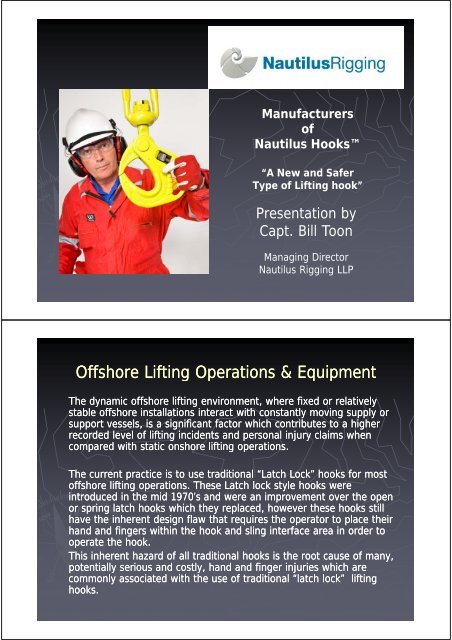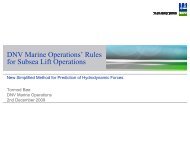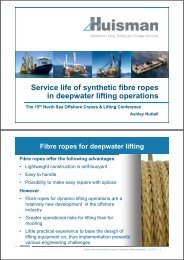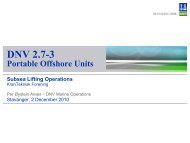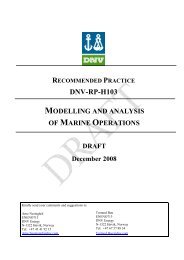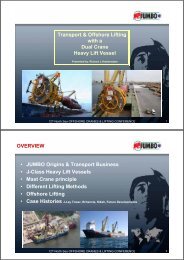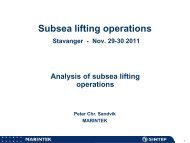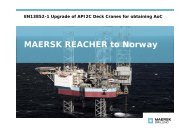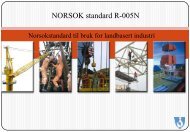Offshore Lifting Operations & Equipment
Offshore Lifting Operations & Equipment
Offshore Lifting Operations & Equipment
Create successful ePaper yourself
Turn your PDF publications into a flip-book with our unique Google optimized e-Paper software.
Manufacturers<br />
of<br />
Nautilus Hooks<br />
“A New and Safer<br />
Type of <strong>Lifting</strong> hook”<br />
Presentation by<br />
Capt. Bill Toon<br />
Managing Director<br />
Nautilus Rigging i LLP<br />
<strong>Offshore</strong> <strong>Lifting</strong> <strong>Operations</strong> & <strong>Equipment</strong><br />
The dynamic offshore lifting environment, where fixed or relatively<br />
stable offshore installations ti interact t with constantly tl moving supply or<br />
support vessels, is a significant factor which contributes to a higher<br />
recorded level of lifting incidents and personal injury claims when<br />
compared with static onshore lifting operations.<br />
The current practice is to use traditional “Latch Lock” hooks for most<br />
offshore lifting operations. These Latch lock style hooks were<br />
introduced in the mid 1970’s and were an improvement over the open<br />
or spring latch hooks which they replaced, however these hooks still<br />
have the inherent design flaw that requires the operator to place their<br />
hand and fingers within the hook and sling interface area in order to<br />
operate the hook.<br />
This inherent hazard of all traditional hooks is the root cause of many,<br />
potentially serious and costly, hand and finger injuries which are<br />
commonly associated with the use of traditional “latch lock” lifting<br />
hooks.
Common Injuries and Potential Costs<br />
Most users of traditional latch lock hooks have experienced this inherent<br />
hazard first hand with minor pinch and trap injuries i or “Shackle Bites” to<br />
their fingers when operating or using these hooks.<br />
In practice these incidents are so common they are generally unreported<br />
and are accepted as “operator error”, These minor injuries amount to<br />
bruised fingers with little or no downtime nor any bottom-line costs.<br />
Conversely a portion of these pinch and trap injuries are very serious, and<br />
in some recorded cases have unfortunately left employees with permanent<br />
disabilities including loss of fingers and use of hands.<br />
The majority of ensuing compensation claims are understandably settled<br />
out of court, however there are many recorded cases where serious hand<br />
injuries sustained while using traditional latch lock hooks have been<br />
awarded compensation from several thousand to several million dollars.<br />
Objectives<br />
Having experienced this safety hazard first hand during offshore cargo<br />
operations Captain Toon incorporated Nautilus Rigging Ltd with the<br />
specific aim of developing his safety concepts to produce a new and<br />
technically advanced d design of self locking safety hooks that t would<br />
eliminate the inherent design flaws and risks associated with the use of<br />
traditional hooks.<br />
Nautilus Rigging invested over 3 years in research and development to<br />
refine their safety concepts and design criteria. Their program included<br />
extensive modelling and bench testing phases which culminated in the<br />
Nautilus Hooks design for which h a small batch working prototype t hooks<br />
were commissioned in 2009 for an Industry sponsored field trial in the<br />
demanding <strong>Offshore</strong> North Sea environment.
Trial Data & Participants Comments<br />
► The unique safety features and operational benefits of Nautilus Hooks<br />
achieved an exceptional 89% approval rating from the offshore trial<br />
participants after more than 3,125 man-hours of use.<br />
► 89% found the side mounted sliding lock much easier to operate than a<br />
traditional latch lock.<br />
► 84% agreed that Nautilus Hooks improved the level of personal safety<br />
during offshore crane operations.<br />
► “The handle gives absolute protection to my hand, I now have complete<br />
control of the hook at all times during use”<br />
► “Nautilus Hooks feel very light and are easy to use, I don’t get sore<br />
wrists like I used to with the old hooks ”<br />
► “Nautilus Hooks are much easier and quicker to load and unload<br />
compared to latch lock hooks”<br />
► “Nautilus Hooks are absolutely the safest hooks I have ever used”<br />
Nautilus Hooks - Unique Safety Features<br />
Offset pivot pin for<br />
default self locking<br />
Product Markings<br />
Include:<br />
Hook Model code<br />
CE marking<br />
Clearly marked WLL<br />
Manufacturers code<br />
Measuring nibs for<br />
easy onsite<br />
specification checks<br />
Unique internal<br />
profile for quick and<br />
easy load and discharge<br />
Smooth external profile<br />
with NO latch protrusions<br />
Patented, fully enclosed<br />
locking slide for easy lock<br />
operation<br />
Marine Grade 316<br />
Stainless steel spring<br />
Patented unique<br />
safety handle and<br />
finger grip<br />
Unobstructed<br />
t handle space<br />
No moving parts<br />
CE certification and<br />
manufacturing standard
Quality Assurance<br />
►<br />
►<br />
►<br />
►<br />
►<br />
►<br />
►<br />
►<br />
Nautilus Hooks are manufactured to EU standard BS/EN1677-1-2000+A1:2008<br />
Nautilus Hooks are DNV type approved. (DNV Certificate S-6103)<br />
Nautilus Hooks are CE certified and manufacturers test certificate supplied with all<br />
hooks.<br />
Nautilus Hooks have a Minimum Breaking Load of 4 x WLL (No deformation)<br />
Nautilus Hooks are 100% individually proof tested to 2.5 x WLL prior to packaging.<br />
Nautilus Hooks are marked with a coded Year/Week of manufacture for simple<br />
product traceability.<br />
Corrosion resistant Marine Grade 316 Stainless Steel lock spring.<br />
Dacromet® coated forged locking slide for added strength and corrosion resistance.<br />
► Nautilus Hooks incorporate measuring nibs for simple, easy onsite specification<br />
checks.<br />
HSE - PUWER 98 (UK) Regulations state:<br />
An employer providing lifting equipment for use in the workplace MUST<br />
ensure that the risks created by the use of the equipment are eliminated,<br />
or controlled where possible, by providing the appropriate hardware<br />
We make the Hook<br />
You make the choice


